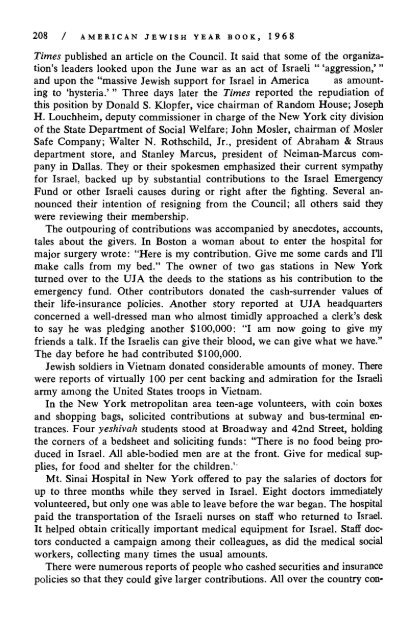1968_4_arabisraelwar
Create successful ePaper yourself
Turn your PDF publications into a flip-book with our unique Google optimized e-Paper software.
208 / AMERICAN JEWISH YEAR BOOK, <strong>1968</strong><br />
Times published an article on the Council. It said that some of the organization's<br />
leaders looked upon the June war as an act of Israeli " 'aggression,'"<br />
and upon the "massive Jewish support for Israel in America as amounting<br />
to 'hysteria.' " Three days later the Times reported the repudiation of<br />
this position by Donald S. Klopfer, vice chairman of Random House; Joseph<br />
H. Louchheim, deputy commissioner in charge of the New York city division<br />
of the State Department of Social Welfare; John Mosler, chairman of Mosler<br />
Safe Company; Walter N. Rothschild, Jr., president of Abraham & Straus<br />
department store, and Stanley Marcus, president of Neiman-Marcus company<br />
in Dallas. They or their spokesmen emphasized their current sympathy<br />
for Israel, backed up by substantial contributions to the Israel Emergency<br />
Fund or other Israeli causes during or right after the fighting. Several announced<br />
their intention of resigning from the Council; all others said they<br />
were reviewing their membership.<br />
The outpouring of contributions was accompanied by anecdotes, accounts,<br />
tales about the givers. In Boston a woman about to enter the hospital for<br />
major surgery wrote: "Here is my contribution. Give me some cards and I'll<br />
make calls from my bed." The owner of two gas stations in New York<br />
turned over to the UJA the deeds to the stations as his contribution to the<br />
emergency fund. Other contributors donated the cash-surrender values of<br />
their life-insurance policies. Another story reported at UJA headquarters<br />
concerned a well-dressed man who almost timidly approached a clerk's desk<br />
to say he was pledging another $100,000: "I am now going to give my<br />
friends a talk. If the Israelis can give their blood, we can give what we have."<br />
The day before he had contributed $100,000.<br />
Jewish soldiers in Vietnam donated considerable amounts of money. There<br />
were reports of virtually 100 per cent backing and admiration for the Israeli<br />
army among the United States troops in Vietnam.<br />
In the New York metropolitan area teen-age volunteers, with coin boxes<br />
and shopping bags, solicited contributions at subway and bus-terminal entrances.<br />
Four yeshivah students stood at Broadway and 42nd Street, holding<br />
the corners of a bedsheet and soliciting funds: "There is no food being produced<br />
in Israel. All able-bodied men are at the front. Give for medical supplies,<br />
for food and shelter for the children.''<br />
Mt. Sinai Hospital in New York offered to pay the salaries of doctors for<br />
up to three months while they served in Israel. Eight doctors immediately<br />
volunteered, but only one was able to leave before the war began. The hospital<br />
paid the transportation of the Israeli nurses on staff who returned to Israel.<br />
It helped obtain critically important medical equipment for Israel. Staff doctors<br />
conducted a campaign among their colleagues, as did the medical social<br />
workers, collecting many times the usual amounts.<br />
There were numerous reports of people who cashed securities and insurance<br />
policies so that they could give larger contributions. All over the country con-


